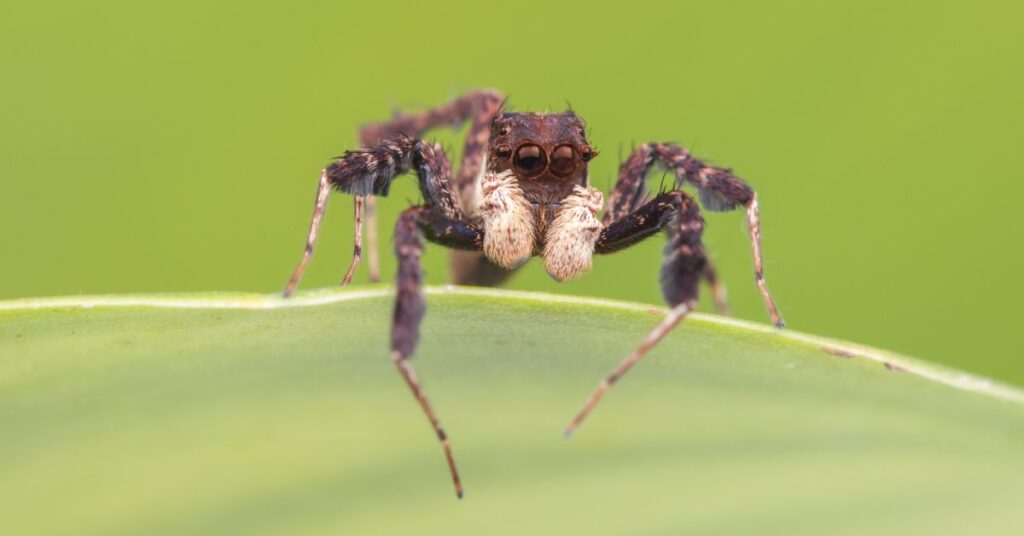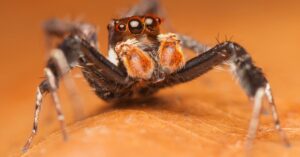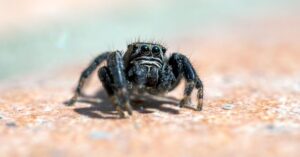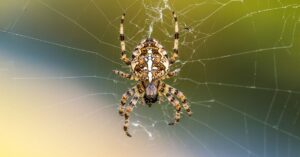
Everyone knows that the larger the brain, the more intelligent the species, right? For example, dolphins and monkeys are far more brainer than frogs or lizards. Right? But what about spiders? Do spiders have brains? That’s todays burning question and it’s one we intend to answer. So read on.
Behaviours that can be described as “cognitive,” as opposed to automatic responses, could be fairly common among spiders, says Dimitrov, co-author of a study on spider diversity published in the 2021 Annual Review of Entomology1. From orb weavers that adjust the way they build their webs based on the type of prey they are catching, to ghost spiders that can learn to associate a reward with the smell of vanilla, there’s more going on in spider brains than they commonly get credit for.
Jumping spiders are the undisputed champions of cognition among spiders. Whilst these tiny arachnids have brains that could literally fit on the head of a pin, they are as relatively intelligent as an animal with a much larger brain, like a dog or even a human toddler.
“It’s not so much the size of the brain that matters, but what the animal can do with what it’s got,” – Fiona Cross, University of Canterbury in Christchurch, New Zealand.
Eyesight
One possible reason for jumping spiders to exhibit such intelligence is their eyesight. They have the sharpest vision known for animals their size, which is typically just 1 mm to 2.3 cm in length.
They utilise their eyesight by stalking and then pouncing on their prey as mentioned in a previous article, they don’t build a web like the traditional spider and wait for prey to fall into it.
Hunting Skills
The jumping spider genus Portia, found in Africa, Asia and Australia prefers to hunt other spiders and has strategies tailored to each species it preys upon.
University of Canterbury jumping spider researcher Robert Jackson2 has discovered that many of Portia’s tactics are quite devious.
For example, when hunting another group of jumping spiders called Euryattus, Jackson reports Portia mimics the male Euryattus’ mating shake and lures the female into an ambush.
And to attack a web-building spider, Portia deceives the spider into moving closer by plucking gently at the silk strands of the web.
If the prey spider is larger, and potentially more dangerous, Portia will instead create a slight disturbance like a fruit fly contacting a single strand at the edge of the web.
As soon as the spider wanders over to inspect the movement, Portia will pounce and strike with its venomous fangs.
If neither of these strategies work on a particular web spider, Portia will shake the whole web as if a gust of wind has blown over it.
This is purely a smokescreen for vibrations as Portia crawls along the web. Jackson found that Portia will try different methods, speeds, and patterns until it finds just the right combination to fool each individual web spider it hunts.
Do Spiders Have Feelings?
Despite the intelligence of the jumping spider, we don’t know for sure if spiders have feelings.
However, most experts agree on the idea that spiders are not capable of having feelings in the traditional human sense of the word.
Research has led many to believe that spiders simply don’t experience emotions in the same way that humans or more complex animals do.
Spider Silk
Another way of answering the question “Do Spiders Have Brains?” is through the use of their silk.
With the help of their webs, they are capable of planning, learning, foresight, and other smarts that indicate they may possess consciousness.
For example, if an Orb Weaver hasn’t fed for a while3, she will tighten up the strings on her web so that she is able to feel even the slightest vibration and thus catch prey she may have missed otherwise.
A further example comes from the web-building process itself. According to decades of research from scientists like William Eberhard4, a spiderweb is easier to build than it looks.
What appears to be an extremely complicated process involving thousands of steps, actually requires only a short list of rules that spiders follow at each junction. When experimenters start cutting out pieces of a web as it’s being built, a spider makes different choices.
Similarly, if one section of the web catches more prey, the spider may enlarge that part in the future.
So, all the evidence points towards spiders actually being quite intelligent creatures. What do you think? Are you surprised? They must be doing something right, after all, arachnids have been around for 400 million years, they’re bound to be a bit clever!



